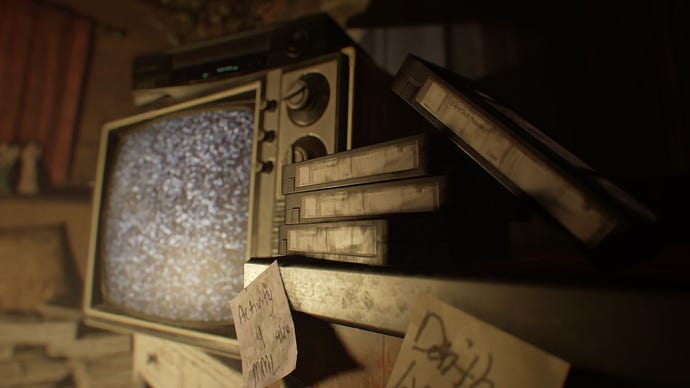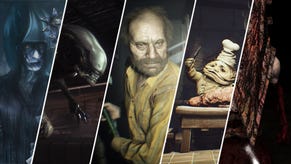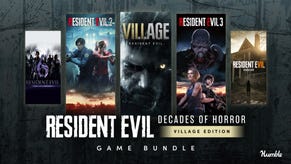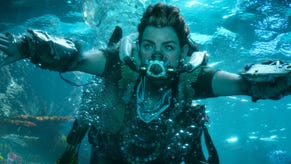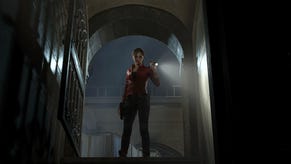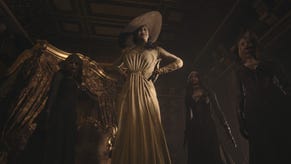Let's talk spoilers, tapes and DLC with Resident Evil 7's director Koshi Nakanishi
Resident Evil is back.
Last week Resident Evil 7 was released and proved to be a reinvigorating elixir for Capcom's flagship horror franchise, scoring well with critics and earning praise off us in our review. It's good stuff.
A few days prior to our review, we published an interview with Resident Evil 7's Producer and Director where the pair talked us through some of the changes they've made to the series formula and how RE7 came to be in its current form. Once we wrapped up those questions I had some questions about elements of the game's design that some might regard as spoilery - so we broke them off and held them back.
Plenty of you have finished the game at this point, so here's part two of our interview. Below you'll find questions on tapes, the structure of the game and the future of the Resident Evil series. These questions and answers remain deliberately vague, but the particularly spoiler-sensitive might want to beware.
VG247: So, skipping into spoiler territory... as the game progresses, it changes a lot. Once you find yourself out of the house proper, the last few areas the game put you into really feel more action-driven. To me, in fact, it felt a little more like... the game starts out like Resident Evil, Resident Evil 2, but by the time you reach the end it feels more like 4, 5, 6, at least to a point. Was that a conscious decision on your part?
Koshi Nakanishi: [In English] Exactly.
[In Japanese] I'm happy that was your question, because the fact that you were able to feel that about the game shows that our idea has actually been appreciated and noticed. I didn't just want to say exactly, so I'm adding that! [laughs]
To go a little further, I also think you really have to escalate something throughout the game as the player gets better at it. If you have an amazing horror atmosphere where you're someone who has no weapons in their hands and they can just die at any moment - having that for the whole game, people would get tired of it, no matter how great it is at the start.
As you get stronger and you're able to respond better to threats, I think there's a natural escalation in the action that can take place. By the end once you've got fully immersed in the environment and the story and you know what's going on... once you're no longer moment-to-moment scared, I think it's natural for the action elements to come in the flow towards the end of the game. I think you have to have that scale of difference throughout the game just to keep players interested.
"If you have an amazing horror atmosphere where you're someone who has no weapons in their hands and they can just die at any moment - having that for the whole game, people would get tired of it, no matter how great it is at the start."
Balance is probably a challenge there - balancing the action and the horror, and also the weapons and enemies so they work in both styles. How do you feel about finding that balance? Do you think you were successful?
I hope that we were... and I think the team as a whole has been very happy with how we've been able to combine elements from the series. There's the more new approaches we've had, but we've also managed to keep some of the older stuff that makes Resident Evil great.
I want to talk a little about the tapes. I think they're a great idea. I particularly liked the gameplay built around them... the way that each tape basically serves as a preparation for the next major area of the game. How did this system come about?
The position of the tapes for us was that... well, in this game we don't have any cutscenes. It's first person, the camera never comes out, you never see your character. We're going for that narrative style, so... everything happening within your experience meant that we've kept a lot of additional story to the files and the clippings. You can check props and get information, that kind of thing. You build up this information in your head and create a picture of the background of the story in your mind; a picture of what's going on.
On top of that we wanted to make something that's more visual and more interactive than just having those elements... and we reached the tapes.
It's also a mechanism that allows us to change time and place without breaking the immersion. When you've got a sort of seamless first person narrative, you don't just cut to the next day or a different location on the planet. That kind of means that you don't have that freedom to say 'oh, here's something that happened to someone else', but the tapes feel like a natural way to let you actually see 'well, here's something somebody else did at a different time'.
Once you start a tape you're not the same person, you're not in the same place. We can also use this to give a little sneak peek or narrative hint at what's coming next in the game, all while in the context of this still being Ethan located in the same place.
I imagine movies were an influence on this format, too?
Of course, there is another element to the tapes, and that's the horror. The idea of horror movies like the found footage Blair Witch style or the videotape theme in The Ring... it's something that's appeared in horror movies before. It's got that atmosphere about it.
Tapes also let us do things we can't do in the main game. We can have a tape where the main character dies at the end - we can't just kill your character in the middle of a normal game. Or we can just leave it open where you don't know what happened - the camera drops and you just don't know what happened to them. That can leave you uneasy as to if the same thing will happen to you.
Overall they were a great way to let us achieve a lot of the things we wanted to do in the game while keeping the immersive qualities. We're happy with it.
"Tapes also let us do things we can't do in the main game. We can have a tape where the main character dies at the end - we can't just kill your character in the middle of a normal game."
When all is said and done, this game is still quite a big change. Do you think this is a template for the future?
I think it would be interesting if this became, like you say, a template for future titles, but... the game isn't even out yet as we speak [this interview was conducted the week prior to launch], so we want to just launch the game and really measure and see how everyone enjoys it, see how they feel about it, gather feedback. Then we'll take that on board before we decide what we're going to do next.
Can you talk a little about your plan from here on out? The game does wrap up its story, but it also leaves some interesting threads dangling about where characters go or who certain characters really are that are no doubt going to leave fans screaming for more information...
First, we have more stuff coming after launch. There's the DLC content in the season pass, the banned footage 1 and banned footage 2. These are kind of little unique experiences, little side stories that'll explore the story from different angles. Then there's also an additional story episode coming for free later as well. Even if some people thought that 11 or 12 hours for one run through was a little on the short side, they've got more to look forward to in the near future.
Some of those elements you mentioned... and we'll both be super vague... some of those elements are actually followed up on in the post-launch content, so you can wait and see that stuff. But also, really, we have some other ideas about where can take this next. We've got plans on how to develop this story further... we're excited for the possibilities.
